Spectrum Summary: Nationalist Response in the wake of World War II | History for UPSC CSE PDF Download
Congress Crisis on Method of Struggle
- There were issues of fake memberships and unethical methods employed in trying to getting into the congressional committees and controlling them.
- Gandhi firmly believed that Congress should first put its house in order before the movement could again be launched; besides, he also felt the masses were not in the mood for a struggle. There were others who felt that the struggle should continue.
Haripura and Tripuri Sessions: Subhash Bose’s Views
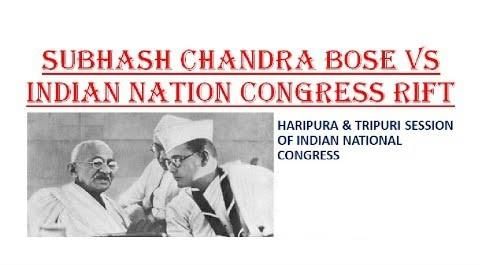
- Subhash Chandra Bose was president of the Bengal Provincial Congress Committee. His main area of work lay in the organization of the youth and promoting the trade union movement. Subhash Bose did not agree with Gandhi and other leaders of the Congress on many aspects of the struggle for freedom.
- Along with Jawaharlal Nehru opposed the Motilal Nehru Report, which spoke for dominion status for India. Bose was all for full independence; he also announced the formation of the Independence League. When the Lahore Congress session under Jawaharlal Nehru’s presidency adopted a resolution that the Congress goal would be Poorna Swaraj’, Bose fully endorsed the decision.
Haripura
- At the Congress meeting in Haripura, Gujarat, in February 1938, Bose was unanimously elected president of the session. He was firm in his belief that the Congress ministries in the provinces had immense revolutionary potential, as he said in his presidential address.
- Bose also talked of the economic development of the country through planning and was instrumental in setting up a National Planning Committee later.
- The session adopted a resolution that Congress would give moral support to those who were agitating against the governance in the princely states.
1939: Subhash Wins but Congress Faces Internal Strife
- In January 1939, Subhash Bose decided to stand again for the president’s post in the Congress. Gandhi was not happy with Bose’s candidature.
- Subhash Bose won the election by 1580 votes against 1377, he got the full support of congress.
Tripuri Session (March 1939)
- In March 1939 the Congress session took place at Tripuri, in the Central Provinces (near Jabalpur in present Madhya Pradesh).
- The working committee, the ruling body of the Congress, is not elected, but nominated by the president; the election of the president is thus a constitutional opportunity through which the members expressed the nature of the leadership of the Congress.
- A resolution was moved by Govind Ballabh Pant, reaffirming faith in Gandhian policies and asking Bose to nominate the working committee Lin in accordance with the wishes of Gandhiji i”, and it was passed without opposition from the socialists or the communists.
- Gandhi was not willing to lead a Congress struggle based on the radical lines preferred by Bose, even as Bose was not willing to compromise on his ideas. They preferred a united Congress led by Gandhi, as the national struggle was of utmost importance
- Bose resigned from the president’s post in April 1939.
Gandhi and Bose: Ideological Differences
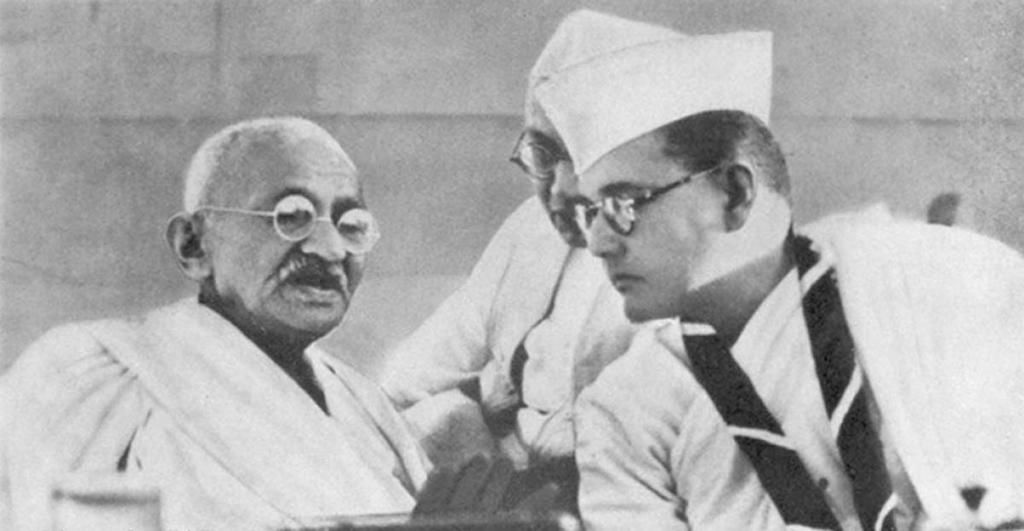 Gandhi Ji and Subhash Chandra Bose
Gandhi Ji and Subhash Chandra Bose
- Non-Violence versus Militant Approach: Gandhi was a firm believer in ahimsa (non-violence) and satyagraha (truth force) as a way to gain any goal. Bose believed that Gandhi's strategy based on the ideology of non-violence would be inadequate for securing India’s independence.
- Means and Ends: Bose had his eye on the result of the action. Gandhi felt that the nonviolent way of protest that he propagated could not be practiced unless the means and ends were equally good. Form of Government- Bose veered towards the idea that, at least in the beginning, a democratic system would not be adequate for the process of nation rebuilding and the eradication of poverty and social inequality. Gandhi's ideas on government can be found in the Hind Swaraj (1909), it was “the nearest he came to producing a sustained work of political theory.”
- Militarism: Subhas Bose was deeply attracted to military discipline and was thankful for the basic training he received in the University Unit of the India Defence Force.
- Gandhi was against the military on the whole. His Ramrajya, being built on the concept of truth and nonviolence and self-regulation
- Ideas on Economy, Gandhi's concept of Swaraj had its own brand of economic vision. He wanted a decentralized economy without state control. Bose considered economic freedom to be the essence of social and political freedom.
- He was all in favor of modernization which was necessary to be brought about by industrialization. Bose classified industry into three categories: heavy, medium, and cottage. Heavy industries, he said, form the backbone of the national economy.
- Religion, Gandhi was primarily a man of religion. Truth and non-violence were the two principles that helped Gandhi in evolving a comprehensive view of religion that went beyond narrow sectarianism. Subhash Bose believed in Upanishadic teachings.
- He revered the Bhagavad Gita and was inspired by Vivekananda. He was also inspired by India of the past as reinterpreted by thinkers.
- He named his force Azad Hind Fauz, and there were many non-Hindus in that army and who were close to him. IN A was to be a mixture of various religions, races, and castes with total social equality of all soldiers.
- Caste and Untouchability- Gandhi's goals for society were mainly three: eradicating untouchability, maintaining the varna distinctions of the caste system, and strengthening tolerance, modesty, and religiosity in India.
- Bose looked forward to an India changed by a socialist revolution that would bring to an end the traditional social hierarchy with its caste system; in its place would come an egalitarian, casteless, and classless society. Subhas Bose completely rejected social inequality and the caste system.
- Women: In Gandhi's words, “To call women the weaker sex is a libel; it is man's injustice to women.” Subhash Bose had a more robust view of women. Bose considered women to be the equals of men, and thus they should be prepared to fight and sacrifice for the freedom of India. In 1943, he called on women to serve as soldiers in the Indian National Army.
- This was the most radical view. He formed a women's regiment in the IN A in 1943, named the Rani ofJhansi Regiment.
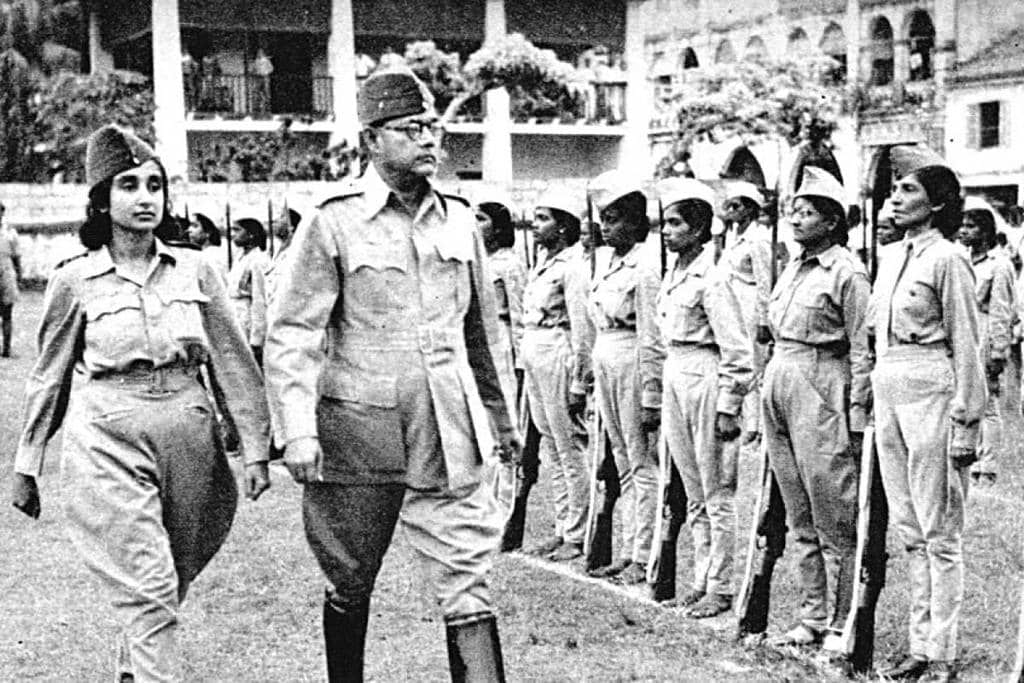 Rani of Jhansi Regiment
Rani of Jhansi Regiment
- This was the most radical view. He formed a women's regiment in the IN A in 1943, named the Rani ofJhansi Regiment.
- Education: Gandhi was against the English system of education as also against the use of English as a medium of instruction. He wanted education to be in the vernacular. He advocated free and compulsory education for all boys and girls between 7 and 14 years.
- Subhash Bose was for higher education, especially in the technical and scientific fields, as he wanted an industrial India.
Second World War and Nationalistic Response
On September 1, 1939, Germany attacked Poland - the action that led to the Second World War. On September 3, 1939, Britain declared war against Germany
Congress Offer to Viceroy
The Indian offer to cooperate in the war effort had two basic conditions:
- Formation of a Constituent Assembly:. constituent assembly should be established after the war to determine the political framework for an independent India.
- Immediate Responsible Government:. genuinely responsible government should be set up at the Centre without delay.
However, this offer was rejected by Linlithgow, the British Viceroy of India during the war.
CWC Meeting at Wardha
- Official Congress position was adopted at the Wardha session of the Congress Working Committee.
- Mahatma Gandhi, who had all sympathy for Britain in this war because of his total dislike of the fascist ideology, advocated unconditional support to the Allied powers.
- Subhas Chandra Bose and other socialists- In their opinion, the war was being fought by imperialists on both sides; each side wanted to protect its colonial possessions and gain more territories to colonize, so neither side should be supported by the nationalists.
- Jawaharlal Nehru was not ready to accept the opinion of either Gandhi or of the socialists.
- The CWC resolution condemned Fascist aggression. It said that
- India could not be a party to a war being fought, on the face of it, for democratic freedom, while that freedom was being denied to India;
- If Britain was genuinely fighting for democracy, it needed to end imperialism in its colonies and establish full democracy in India. The government should also clarify its war aims soon and explain how democratic principles would be applied in India after the war.
Government Attitude and Congress Ministries’ Resignation
- Viceroy Linlithgow, in his statement, made on October 17, 1939, tried to use the Muslim League and the princes against the Congress. The government
(i) Refused to define British war aims beyond stating that Britain was resisting aggression;
(ii) Said it would, as part of the future arrangement, consult "representatives of several communities, parties and interests in India, and the Indian princes” as to how the Act of 1935 might be modified;
(iii) Said it would immediately set up a "consultative committee" whose advice could be sought whenever required.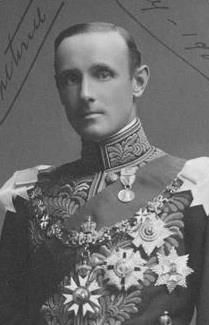 Viceroy Linlithgow
Viceroy Linlithgow - Government’s Hidden Agenda: Linlithgow’s statement was part of a British strategy to use the war to regain influence over the Congress. In May 1940, a secret plan called the Draft Revolutionary Movement Ordinance was made to take strong actions against the Congress.
- Congress Ministries Decide to Resign: On October 23, 1939, the CWC meeting
(i) Rejected the viceregal statement as a reiteration of the old imperialist policy;
(ii) Decided not to support the war; and
(iii) Called upon the Congress ministries to resign in the provinces. - Debate on the Question of Immediate Mass Satyagraha-Gandhi and his supporters were not in favor of an immediate struggle because they felt that the
(i) Allied cause was just; communal sensitiveness and lack of Hindu-Muslim unity could result in communal riots;
(ii) Congress organization was in shambles and the atmosphere was not conducive for a mass struggle; and
(iii) Masses were not ready for a struggle. The Ramgarh session of the Congress was held in March 1940 with Maulana Abul Kalam Azad in the president’s chair. All agreed that a battle must be waged but there was disagreement over the form. - Pakistan Resolution:Lahore (March 1940) -The Muslim League passed a resolution calling for the “grouping of geographically contiguous areas where Muslims are in majority (North West, East) into independent states.
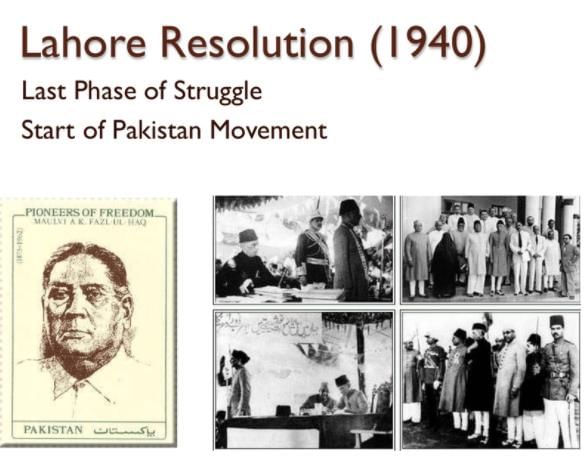
August Offer (1940)
- Linlithgow announced the August Offer (August 1940) which proposed:
(i) Dominion status as the objective for India;
(ii) Expansion of viceroy’s executive council which would have a majority of Indians
(iii) Setting up of a constituent assembly after the war where mainly Indians would decide the constitution according to their social, economic, and political conceptions, subject to fulfillment of the obligation of the government regarding defense, minority rights, treaties with States, all Indian services; and
(iv) No future constitution to be adopted without the consent of minorities. - Responses: The Congress rejected the August Offer. The Muslim League welcomed the veto assurance given to the League
- Evaluation: In July 1941, the viceroy’s executive council was enlarged to give the Indians a majority of 8 out of 12 for the first time, but the British remained in charge of defense, finance, and home.
Individual Satyagrahas
- The government had taken the adamant position that no constitutional advance could be made till the Congress came to an agreement with the Muslim leaders. It issued ordinance after ordinance taking away the freedom of speech and that of the press and the right to organize associations.
- The aims of launching individual satyagraha were—
(i) To show that nationalist patience was not due to weakness;
(ii) To express people’s feeling that they were not interested in the war and that they made no distinction between Nazism and the double autocracy that ruled India; and
(iii) To give another opportunity to the government to accept Congress’ demands peacefully. - If the government did not arrest the satyagraha, he or she would not only repeat it but move into villages and start a march towards Delhi, thus precipitating a movement which came to be known as the "Delhi Chalo Movement’.
- Vinoba Bhave was the first to offer the satyagraha and Nehru, the second. By May 1941, 25,000 people had been convicted for individual civil disobedience.
Gandhi Designates Nehru as his Successor
- CWC overrode Gandhi’s and Nehru’s objections and passed a resolution offering to cooperate with the government in the defense of India, if
(i) Full independence was given after the war, and
(ii) Substance of power was transferred immediately. - Nehru and Gandhi differed in temperament and attitudes towards modernity, religion, God, State, and industrialization. Despite having so many differences, Nehru revered Gandhi, and Gandhi, in turn, believed in Nehru more than his own sons.
Both teacher and disciple had fundamental similarities
- Patriotism in an inclusive sense, i.e., they identified with India as a whole rather than with a particular caste, language, region, or religion. Both believed in non-violence and a democratic form of government.
- Rajmohan Gandhi, in his book, The Good Boatman, writes that Gandhi preferred Nehru to the alternatives because he most reliably reflected the pluralist, inclusive idea of India that the Mahatma himself stood for.
Cripps Mission
In March 1942, a mission headed by Stafford Cripps was sent to India with constitutional proposals to seek Indian support for the war.
Why Cripps Mission was Sent
- Because of the reverses suffered by Britain in South - East Asia, the Japanese threat to invade India seemed real now and Indian support became crucial. There was pressure on Britain from the Allies (USA, USSR, China) to seek Indian cooperation.
- Indian nationalists had agreed to support the Allied cause if substantial power was transferred immediately and complete independence given after the war.
Main Proposals: The main proposals of the mission were as follows.
- An Indian Union with a dominion status would be set up; it would be free to decide its relations with the Commonwealth and free to participate in the United Nations and other international bodies.
- After the end of the war, a constituent assembly would be convened to frame a new constitution. Members of this assembly would be partly elected by the provincial assemblies through proportional representation and partly nominated by the princes.
- The British government would accept the new constitution subject to two conditions: Any province not willing to join the Union could have a separate constitution and form a separate Union, and The new constitution-making body and the British government would negotiate a treaty to effect the transfer of power and to safeguard racial and religious minorities.
- In the meantime, the defense of India would remain in British hands, and the governor-general's powers would remain intact.
Departures from the Past and Implications-
- The proposals differed from those offered in the past in many respects.
- The making of the constitution was to be solely in Indian hands now l and not 'mainly' in Indian hands—as contained in the August Offer).
- A concrete plan was provided for the constituent assembly.
- The option was available to any province to have a separate constitution a blueprint for India’s partition. Free India could withdraw from the Commonwealth.
- Indians were allowed a large share in the administration in the interim period.
Why the Cripps Mission Failed
Various parties and groups had objections to the proposals on different points
Congress objected to
- The offer of dominion status instead of a provision for complete independence;
- Representation of the princely states by nominees and not by elected representatives;
- Right to provinces to secede as this went against the principle of national unity; and
- Absence of any plan for immediate transfer of power and absence of any real share in defense; the governor-general's supremacy had been retained, and the demand that the governor-general is only the constitutional head had not been accepted.
- Nehru and Maulana Azad were the official negotiators for the Congress.
Muslim League
- Criticized the idea of a single Indian Union;
- Did not like the machinery for the creation of a constituent assembly and the procedure to decide on the accession of provinces to the Union, and Thought that the proposals denied the Muslims the right to self-determination and the creation of Pakistan.
|
210 videos|855 docs|219 tests
|
FAQs on Spectrum Summary: Nationalist Response in the wake of World War II - History for UPSC CSE
| 1. Why did the Cripps Mission fail? |  |
| 2. How did World War II impact the rise of nationalism? |  |
| 3. What were the main responses of Indian nationalists to World War II? |  |
| 4. How did the Second World War shape the nationalist movement in India? |  |
| 5. What were the key factors that influenced the nationalist response after World War II? |  |

















